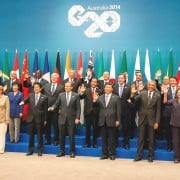|
Getting your Trinity Audio player ready...
|
In its report released to coincide with the upcoming G20 meeting in Turkey, Transparency International (TI) has highlighted how G20 countries, including South Africa, have failed to honour their undertaking to fight corruption through implementing more transparent business practices that would make it difficult for the corrupt to hide or move money across borders. This includes enacting legislation to require the disclosure of the beneficial owners of companies and trusts.
As much as $2-trillion is laundered each year, much of it by hiding company ownership behind opaque structures, and yet hardly any of the G20 member states are doing enough to curb the ease with which cash can be hidden, or illicit financial transactions are conducted.
According to the TI report Just for Show? Reviewing G20 promises on beneficial ownership, which reviews progress against the Beneficial Ownership Transparency Principles adopted by the G20 in November 2014, only the United Kingdom is actively working to curb these unlawful financial flows, scoring the highest of all member states in relation to the 10 principles.
For its part, South Africa, while scoring well on some measures (for example disclosure of information on beneficiaries of trusts), falls woefully short on others (such as the absence of a statutory definition of beneficial ownership).
The majority of G20 countries’ frameworks are rated as average, including Germany, India, Mexico, Japan, Turkey and Russia. A small group of countries, among them some of the world’s biggest economies, falls into the category of ‘Weak Framework’, namely the United States, Australia, Canada, China, Brazil and South Korea.
David Lewis, executive director of Corruption Watch, the South African NGO and local chapter of Transparency International and the body which compiled the South African component of the report, commented: “While this issue appears esoteric and technical, it is actually of prime importance to the difficult process of unmasking the corrupt by preventing them from hiding their ill-gotten gains. South Africa, as the home of the largest and most sophisticated financial centre on the African continent, should take the lead in promoting the disclosure of beneficial ownership.”
The TI report singles out Brazil and South Africa as the two countries that have fallen behind on the most basic aspects of ensuring that we know who the real owners of companies are. Neither South Africa nor Brazil have even legislated an accurate and comprehensive definition of beneficial ownership, the technical term used to describe the real person or persons who ultimately benefit from the ownership of a company.
While the South African parliament has tabled amendments to laws which would help to close existing loopholes, the current success rate in tracking down the movement of cash across borders is severely hampered by shortcomings in company ownership disclosure requirements. According to the Global Financial Integrity report that came out in December 2014, South Africa rated the fifth highest of African countries in terms of illicit financial flows.
Lewis said it’s encouraging that the disclosure of beneficial ownership has been incorporated into the proposed amendments to the Financial Intelligence Centre Act, and more so because the risk-based oversight regime proposed in the amendment bill will bring politically connected persons firmly into the regulatory spotlight.
“However, in the first instance, our demand is that all companies bidding for public contracts should be required to disclose who their beneficial owners are. This would go a long way towards curbing the conflicts of interest and corruption that plagues public procurement.”
For more information please follow the link to the TI report: Just for Show? Reviewing G20 promises on beneficial ownership.
Download this press statement.
For more information:
David Lewis – 082 576 3748








